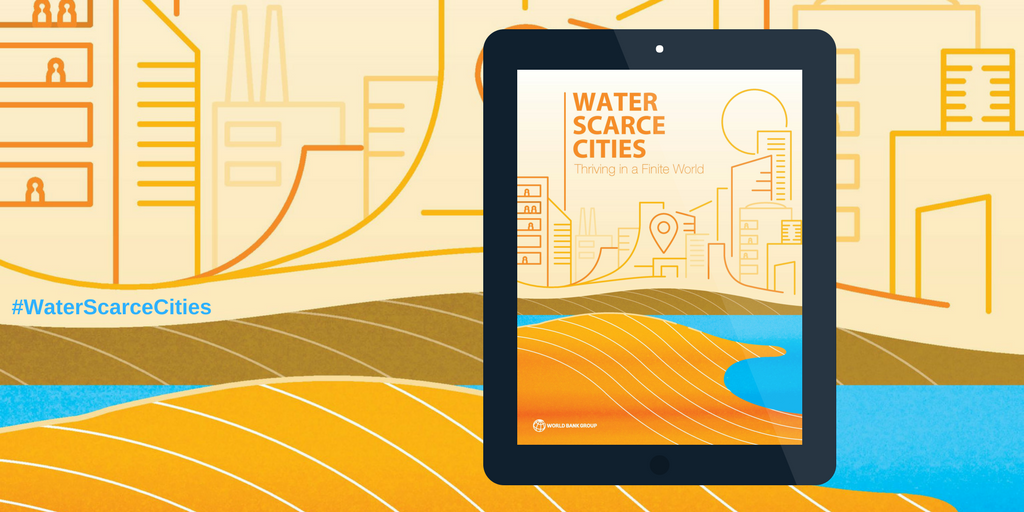Newsrooms around the world all too often publish headlines about water crisis. The world watches while a number of cities, regions, and even countries suffer from drought.
Causes of water scarcity are rarely simple, or limited to one incident or indicator. In addition, anything concerning water is intrinsically connected with and driven by several influencing factors.
Although urban centers may embark on emergency demand management and supply augmentation programs, these initiatives may not be sufficient to reduce water demand to levels that will ensure long-term water security.
Part of the challenge for water scarce cities of today is that water business-as-usual is not sufficient to meet today’s water challenges , it is necessary to change water management paradigms that have prevailed in water management for decades. Traditional big pipe solutions (large and complex water and wastewater infrastructure) are not enough to overcome contemporary water crisis, due to issues such as financial pressures and unpredictable climate changes.
Water scarcity is here to stay. Business as usual is not. Cities across the world and throughout history have overcome complex water scarcity challenges, and a new report by the World Bank’s Water Scarce Cities Initiative (WSC) brings 20+ such stories to light – including what challenges were encountered, how they were addressed, and what we can learn from their experiences.

Download the Water Scarce Cities report with case studies here
What Can Water Scarce Cities Learn from Murcia, Spain?
Murcia is on the Mediterranean coast of southeastern Spain with a population of over 1.5 million. Water allocation from the primary local river has historically been granted to irrigators, prompting Murcia to seek out water sources more than 200 kilometers away. In a context of increased water stress, the irrigation lobby has influenced the river basin authority to secure more water rights, leaving the urban sector with no option but to seek alternative water supply options. The city and other local urban centers responded by setting up an institution, the Mancomunidad de Canales del Taibilla, to help them garner political and financial support for infrastructure development and negotiations with irrigators under the auspices of the river basin agency.
Murcia’s water problems – and solutions – are not constrained to the city alone. Its water issues extend beyond the city limits into the river basins where most of the water sources originate. Murcia established clear mechanisms and procedures for managing resources at the basin level that allocate water among users; created procedures for the exchange and trading of these water allocations; and created a step-by-step plan on how these should be applied in the case of emergencies.
What Can Water Scarce Cities Learn from Cyprus?
Cyprus is a Mediterranean island country with a semi-arid climate, limited physical water resources, multiple demands, and dependence mainly on rainfall. In short, a recipe for water scarcity. As such, Cyprus implemented a water management plan in the late 1960s that focused largely on demand management efforts to satisfy competing water users. However, Cyprus continued to experience water scarcity over the next few decades due to increasing population and groundwater over-abstraction, in addition seawater intrusion into coastal aquifers.
Around the early part of this Millennium, tough decisions had to be made to avert major water crisis. However, the development of desalination plants was postponed due to two consecutive years of above average precipitation. In addition, governments were reluctant to impose water restrictions before elections.
The water crisis came to a head in August 2008. Ocean going tankers transported between 35,000-50,000 cubic meters of water every day from Athens, Greece to Limassol, Cyprus, while the population was subject to severe rationing.
Cyprus illustrates that it is important to never let a crisis go to waste. A crisis can be an opportunity to implement positive changes and reforms. This particular crisis opened the door for desalination and reuse development programs, in addition to awareness campaigns and multiple measures to make the water sector more resilient.
Water Scarce Cities: Thriving in a resource finite world
Murcia’s and Cyprus’s experience tells us that water-scarce Cities can be masters of their own destinies, from exploring new ways to manage water to building resilience to future droughts.
The WSC promotes new ways of thinking about water scarcity – by learning from the past, changing with the present, and looking towards the future. Ensuring water security in a world of finite resources means setting up institutions to operate at different scales; and adopting an integrated management approach – for just a few drops in the bucket of possibilities.
It is possible to swiftly and skillfully navigate the water challenges of today to ensure a resource secure world of tomorrow.
RELATED
- For more information about the World Bank’s Water Scarce Cities Initiative, visit: www.worldbank.org/waterscarcecities
- Read: "Water Scarce Cities" Blog Series
- Watch: Water Scarce Cities Initiative Video
- Listen: Water Scarce Cities Podcast
- Follow the conversation via #WaterScarceCities




Join the Conversation